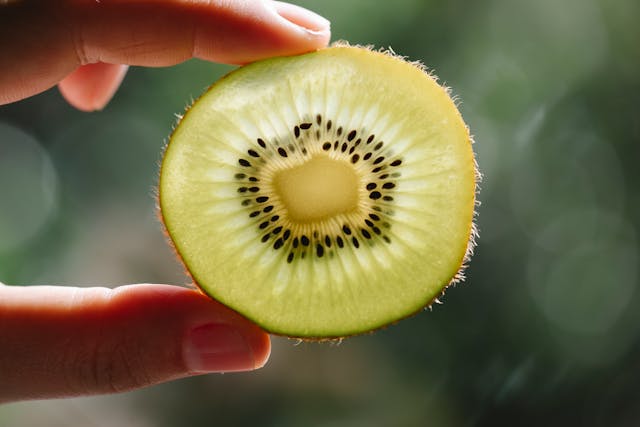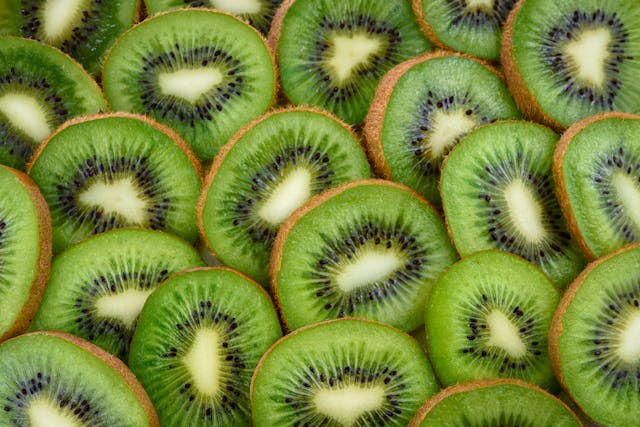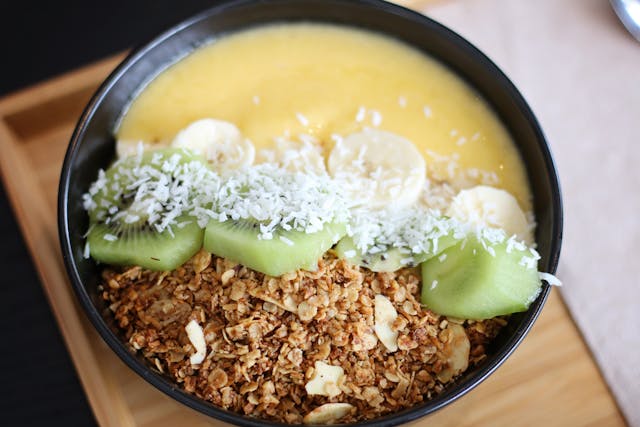YouStill.Live explores the health benefits, nutrients, types, and culinary uses of Kiwi.
Table of Content:
Kiwi
Kiwi, also known as kiwifruit, is a small but mighty fruit packed with an abundance of nutrients and health benefits. Originating from China, this vibrant fruit has gained popularity worldwide, not just for its distinct sweet and tangy taste, but also for its impressive nutrient profile. In addition to being a vitamin C powerhouse, kiwi offers a host of other health-promoting properties that make it a must-have addition to any balanced diet. Within this page, we will explore the health benefits, types, and diverse culinary uses of kiwi, highlighting why this fruit should have a permanent spot in your kitchen.
In a nutshell, Kiwi is a nutritional powerhouse offering an impressive array of health benefits. Including enhanced immunity, improved digestion, and better heart and skin health. With its various types and versatile culinary uses, kiwi can be enjoyed in many different ways, from fresh snacks to salsas, desserts, and even cocktails. Whether you are looking to boost your nutrient intake, support your overall health, or simply add a burst of flavor to your meals, kiwi is a delicious and nutritious choice.
Let’s dive into kiwis.
Health Benefits of Kiwi
1. Boosts Immunity
Kiwi is one of the richest sources of vitamin C, a nutrient essential for maintaining a strong immune system. In fact, just one kiwi provides more than the recommended daily intake of vitamin C, which plays a critical role in defending the body against infections. Regular consumption of vitamin C-rich foods like kiwi can help reduce the severity and duration of colds, flu, and other respiratory illnesses.
2. Aids in Digestion
Kiwi contains actinidin, a natural enzyme that assists in the breakdown of proteins, making it a natural digestive aid. This enzyme is especially beneficial after consuming protein-rich meals, as it helps prevent bloating and indigestion. Additionally, the high fiber content of kiwi promotes healthy digestion and regular bowel movements, making it a great choice for those suffering from constipation.
3. Promotes Heart Health
Heart health is another area where kiwi excels. It is rich in potassium, a mineral that helps regulate blood pressure by counteracting the effects of sodium. This helps in preventing hypertension, a major risk factor for heart disease and stroke. Kiwi also contains antioxidants such as vitamins C and E, which protect the heart by reducing oxidative stress and inflammation. The fiber content of kiwi also contributes to lowering LDL (bad) cholesterol levels, further promoting cardiovascular health.
4. Supports Eye Health
Kiwi is rich in the antioxidants lutein and zeaxanthin, which are known to support eye health. These antioxidants protect the eyes from harmful ultraviolet (UV) light and may reduce the risk of age-related macular degeneration (AMD), a leading cause of vision loss in older adults. Including kiwi in your diet may help maintain healthy vision as you age.
5. Helps with Weight Management
For those looking to manage or lose weight, kiwi is an excellent addition to their diet. Low in calories and high in fiber, kiwi helps promote satiety, making you feel fuller for longer. The fiber in kiwi not only aids digestion but also slows the release of sugars into the bloodstream, preventing energy crashes and unhealthy food cravings.
6. Packed with Antioxidants
In addition to vitamin C, kiwi is packed with other potent antioxidants, including vitamin E and various phytonutrients. These compounds help neutralize free radicals, which are unstable molecules that can cause cellular damage and contribute to the development of chronic diseases like cancer and diabetes. The antioxidant properties of kiwi also help reduce inflammation throughout the body, contributing to overall health and longevity.
7. Improves Skin Health
Kiwi’s high vitamin C content plays a pivotal role in collagen production, a protein that keeps the skin firm and elastic. Regular consumption of kiwi can help improve skin texture, reduce wrinkles, and protect against the damaging effects of UV radiation and pollution. Kiwi also contains vitamin E, which nourishes the skin and promotes a healthy complexion.
8. Enhances Sleep Quality
Kiwi may even help improve sleep quality due to its serotonin content. Serotonin is a neurotransmitter that helps regulate sleep cycles. Some studies have suggested that consuming kiwi before bed may promote better sleep quality, making it a potential natural remedy for those suffering from insomnia or poor sleep.

Kiwi Nutrients
Kiwi is not only low in calories but also brimming with essential nutrients. We look at the key nutrients found in 100 grams of kiwi.
- Calories: 61 kcal
- Carbohydrates: 14.7 g
- Fiber: 3 g
- Protein: 1.1 g
- Fat: 0.5 g
- Vitamin C: 93 mg (103% of daily value)
- Vitamin K: 40.3 µg (34% of daily value)
- Potassium: 312 mg (9% of daily value)
- Vitamin E: 1.46 mg (10% of daily value)
- Folate: 25 µg (6% of daily value)
Types of Kiwi
1. Green Kiwi (Hayward Kiwi)
The most common variety, green kiwi, has a fuzzy brown skin and bright green flesh with small black seeds. It has a tart and sweet flavor and is widely available in supermarkets year-round.

2. Golden Kiwi
Golden kiwi, also known as gold kiwi, has smooth, bronze-colored skin and vibrant yellow flesh. It is sweeter and less acidic than the green variety, making it a preferred option for those who enjoy a milder taste.
3. Hardy Kiwi (Baby Kiwi)
Also known as kiwi berry, hardy kiwi is a smaller, grape-sized variety with smooth, edible skin. It is sweeter than larger kiwis and is often eaten whole, without the need for peeling.
4. Red Kiwi
This unique variety features a red ring around its seed core, giving it a striking appearance. Red kiwi is less common and has a mildly sweet flavor, with less acidity than green kiwi.
Culinary Uses of Kiwi
Kiwi’s versatility in the kitchen makes it a favorite ingredient in both sweet and savory dishes. Let’s see some creative ways to incorporate kiwi into your meals.

1. Fresh Snacking
One of the simplest ways to enjoy kiwi is to slice it in half and scoop out the flesh with a spoon. Its tangy-sweet flavor makes it a refreshing snack on its own or alongside other fruits.
2. Smoothies and Juices
Kiwi can be blended into smoothies or juices, adding natural sweetness and a boost of vitamins. It pairs well with fruits like strawberries, bananas, and oranges.
3. Salads
Kiwi adds a burst of flavor and color to both fruit salads and green salads. Try adding sliced kiwi to mixed greens, along with nuts, cheese, and a drizzle of vinaigrette for a deliciously balanced dish.
4. Desserts
Kiwi is often used as a topping for desserts such as pavlova, fruit tarts, and cakes. Its vibrant color and tart flavor make it the perfect contrast to sweet, creamy desserts.
5. Salsas and Sauces
Diced kiwi works well in fruit salsas, which can be served with grilled meats, fish, or tacos. Its fresh flavor complements savory dishes and adds a tropical twist to meals.
6. Frozen Treats
Frozen kiwi slices can be added to popsicles, or blended into sorbets for a refreshing summer treat.
7. Cocktails and Beverages
Kiwi can be muddled into cocktails or used as a garnish. It also makes a delightful addition to mocktails and infused water.
8. Marinades
Due to the enzyme actinidin, kiwi is a natural tenderizer for meat. Adding kiwi to marinades helps break down tough fibers, making meats softer and more flavorful when grilled or roasted.


